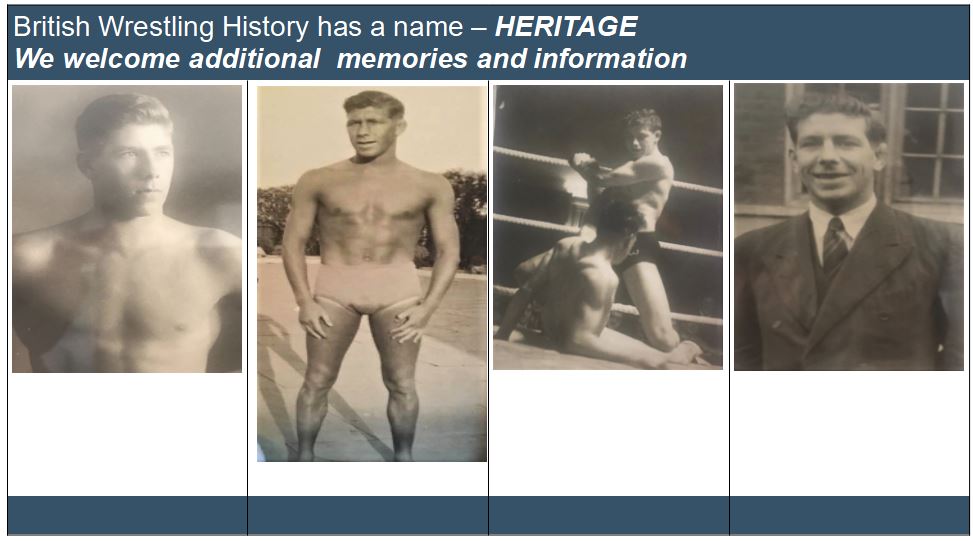Wrestling Heritage welcomes memories, further information and corrections.

It was a tragedy. The loss of a great wrestler. The loss of a man at too young an age. The loss of a husband and father. More than half a century following the tragedy there are still unanswered questions about the death of erstwhile British champion Sonny Wallis, whose life ended in a car crash on 11th December, 1956.
Born Sydney Arthur Wallis in 1914 he was a fine wrestler and one of the heroes who struggled to successfully revive professional wrestling after the second world war. A keen sportsman from an early age Sonny’s first love was swimming, and he was an early member of London’s Penguin Swimming Club, formed in 1921.
Boxing and wrestling were other loves and he was destined to become one of the top light heavyweight wrestlers of his generation. Sonny Wallis served an amateur apprenticeship of five years at the Acton and Chiswick Athletic Club before entering the ranks of professional wrestler in the early 1930s, making his debut against Bob Gregory at the London Club run by Harold Lane.
He was a very skilful wrestler, as illustrated in this report from the Daily Worker on 7th February, 1936: “By far the best bout of the evening was between Bob Gardner, Scotland, and that clever wrestler Sonny Wallace, Hammersmith. Good, clean, clever wrestling as served up by these men received full appreciation of a large audience, which proves there is no necessity for unfair tactics to enhance the games popularity.”
As 1939 ended and a gloomy reality began to dawn the population of Britain had more pressing matters on their minds than professional wrestling. Sonny Wallis disappeared from our wrestling radar in September, 1939, resurfacing four years later in July, 1943. It seems likely that the small distraction called World War Two got in the way of his wrestling career.
We found him back in wrestling action in July, 1943, working fairly regularly until the end of the war. The majority of matches we uncovered were in Manchester, suggesting that his war commitments stationed him in the north of England. The class of opponent had improved from the pre war years, with Sonny now wrestling some of the biggest names of the time, men such as Bert Mansfield, Jack Atherton, Cab Cashford and Vic Hessle.
When peace resumed Sonny appeared on BBC television in 1946, soon after the station re-commenced transmissions following the end of the war, in a wrestling exhibition with Canadian Ed Barker. Both men were to go on to successful careers at the top of their class.
In the post war years our findings are again of Sonny working in Manchester almost weekly. Whilst travelling mostly in northern England and Scotland and occasionally south. He was a busy worker and wrestled many of the top wrestlers in his weight class, which was considered to be a light heavyweight.
Calm and confident were words associated with Sonny’s style as he meticulously outwitted his opponents. Here was a man who could hold his own with the hard men of the ring such as Arthur Beaumont, Jim Foy, Jack Atherton and anyone else the promoters matched with him. Sonny’s reward came in June, 1950, when his defeat of Charlie Fisher led to recognition as British light heavyweight champion.
But in the world of professional wrestling championship status was by no means the measure of greatness. In a world where spectacle vied with sport and competitiveness meant more than having an arm raised in victory there were more important measures of success.
Reliability, courage, humility, trust, loyalty, integrity, and discipline were amongst the qualities required for success as a professional wrestler. The man who paid the wages, the promoter, needed workers who could be relied upon to turn up on the night, trusted to do whatever was needed to entertain the paying fans, courage to risk personal injury night after night, loyalty to the man paying the wages. So a champion, yes, but it was these far greater, personal qualities that made Sonny Wallis one of our great professional wrestlers, working his way up the wrestling bills, entertaining thousands of fans night after night for twenty years before his untimely death.
For around a year he was widely acknowledged as British Light Heavyweight champion; for many more years he was known as one of the best men at his weight. The wrestling world was shocked when they heard of the death of Sonny Wallis, through injuries received in a car crash on 11th December, 1956.
We would like to thank the family of Sonny Wallis for their help in providing this tribute.
The family are seeking memorabilia of Sonny’s career. Please get in touch if you can help.
Page added: 28/06/2020
2200
